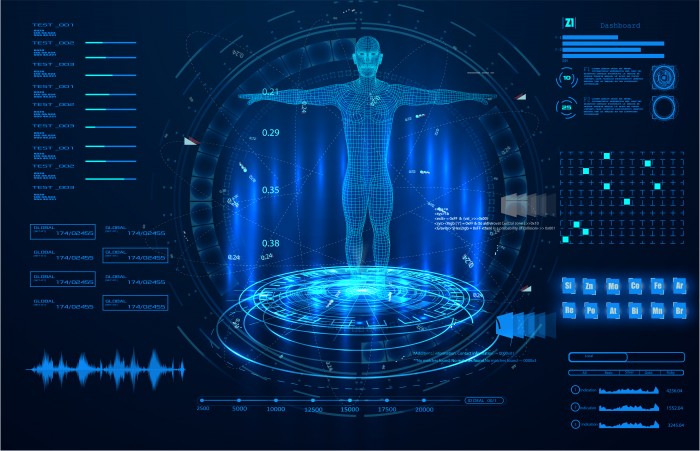DoD Using Artificial Intelligence to Detect Cancer in Medical Images
The project aims to use the best of artificial intelligence technology to identify cancers and other medical issues.

Source: Getty Images
- The Department of Defense’s (DoD) Defense Innovation Unit (DIU) is leveraging artificial intelligence tools and the department’s vast amount of medical data to identify cancers and other conditions.
The project, called Predictive Health, will aim to develop new tools that medical professionals can use to more accurately and quickly identify medical issues in patients.
Scientists will train AI algorithms to look at de-identified DoD medical images to teach it to identify cancers. The AI can then be used with augmented reality microscopes to help medical professionals better identify cancer cells.
Using these tools, providers will be able to catch diseases earlier and reduce costly healthcare procedures.
"From a big-picture perspective, this is about integrating AI into the DOD healthcare system," said Nathanael Higgins, the support contractor managing the program for DIU. "There are four critical areas we think this technology can impact. The first one is, it's going to help drive down cost."
READ MORE: Artificial Intelligence Bests Clinicians in Flagging Prostate Cancer
The project will also develop tools to help healthcare professionals make more informed decisions.
"Medical professionals are already overworked," said Higgins. "We're essentially giving them an additional tool that will help them make confident decisions — and know that they made the right decision — so that we're not facing as many false negatives or false positives. And ultimately we're able to identify these types of disease states earlier, and that'll help the long-term prognosis."
To train these AI algorithms, the Predictive Health project will use DoD data from CT scans, MRIs, x-rays, and slide imagery made from biopsies. Because the department has access to a diverse set of data, the algorithms will be trained on information representative of all patient populations.
"If you think about it, the DOD, through retired and active duty service, is probably one of the largest health care systems in the world, at about 9 million people," said Dr. Niels Olson, the DIU chief medical officer and originator of the Predictive Health project.
"The more data a tool has available to it, the more effective it is. That's kind of what makes DOD unique. We have a larger pool of information to draw from, so that you can select more diverse cases. Unlike some of the other large systems, we have a pretty good representation of the US population. The military actually has a nice smooth distribution of population in a lot of ways that other regional systems don't have. And we have it at scale."
READ MORE: Artificial Intelligence Could Speed COVID-19 Detection, Treatment
Privacy will also be top of mind during the project, DoD officials noted.
"We'll use de-identified information, imaging, from clinical specimens," Olson said. "So this means actual CT images and actual MRI images of people who have a disease, where you remove all of the identifiers and then just use the diagnostic imaging and the actual diagnosis that the pathologist or radiologist wrote down."
Leaders stated that although the AI will eventually serve as a companion tool for providers, it won’t replace human experts entirely.
"The prototype of this technology that we're adopting will not replace the practitioner. It is an enabler — it is not a cure-all. It is designed to enhance our people and their decision making. If there's one thing that's true about DOD, it's that people are our most important resource. We want to give them the best tools to succeed at their job,” said Higgins.
"AI is obviously the pinnacle of that type of tool in terms of what it can do and how it can help people make decisions. The intent here is to arm them with an additional tool so that they make confident decisions 100 percent of the time."
READ MORE: Artificial Intelligence Can Help Radiologists Diagnose Lung Disease
In addition to DIU, the Predictive Health project will involve the Defense Health Agency, three private-sector businesses, and the Joint Artificial Intelligence Center (JAIC). JAIC will provide funding and added technical expertise for the broader initiative.
"The JAIC's contributions to this initiative have engendered the strategic development of required infrastructure to enable AI-augmented radiographic and pathologic diagnostic capabilities," said Navy Capt. (Dr.) Hassan Tetteh, the JAIC's Warfighter Health Mission Initiative chief.
"Given the military's unique, diverse, and rich data, this initiative has the potential to compliment other significant military medical advancements to include antisepsis, blood transfusions, and vaccines.”
Predictive Health is expected to end within 24 months, and the project might then make its way out to practitioners for further testing.
Through the Predictive Health project, DoD will aim to improve healthcare operations and outcomes.
"If you can cut down on the number of acute issues that come up that prevent people from doing their job, you essentially help our warfighting force," Higgins said.
